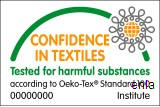
"Confidence in textiles" – this label can be found in the shops on many textiles which have been successfully tested for harmful substances according to OEKO-TEX® Standard 100.
OEKO-TEX® Standard 100 is an independent test and certification system for all types of textiles tested for harmful substances – from threads and fabrics to the ready-to-use items that you can buy in the shops.
This Certification is carried out only by independent, accredited test institutes in Europe and Japan which have demonstrated expertise in the test area as well as a wide spectrum of different research activities for the entire textile industry. For successful certification according to OEKO-TEX® Standard 100 all components of an item have to comply with the requirements without exception, that means in addition to the outer fabric and the sewing threads also the accessory parts such as zips, labels, cords or applications.
In addition to the laboratory tests on the representative production samples supplied by the manufacturers, the authorised OEKO-TEX® test institutes carry out company audits at all companies involved every three years. In the framework of these the OEKO-TEX® auditors examine the production processes and the company quality assurance together with the companies who applied. This creates the best possible certification conditions and ensures a consistent human ecology product quality for the duration of the certification (twelve months).
Who is behind OEKO-TEX®?
The OEKO-TEX® test and certification system is centrally issued by the International Association for Research and Testing in the Field of Textile Ecology with headquarters in Zurich.
Its current members are 16 independent and accredited facilities for textile testing and research in Europe and Japan. In addition, the OEKO-TEX® Association currently operates 50 contact offices in all important global regions of textile production.





